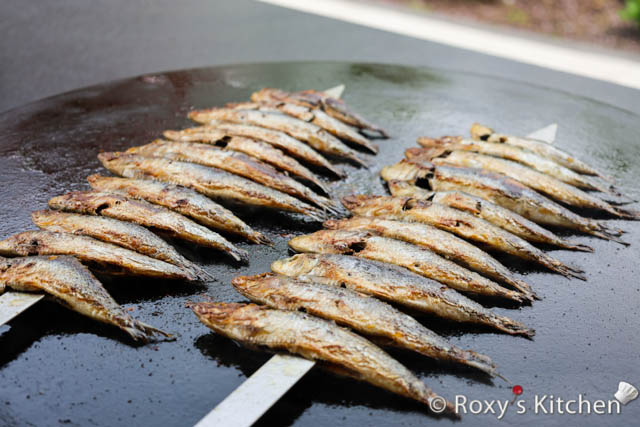
When you’re craving Sardine Skewers (Espetos de Sardinas) but you’re not in Spain to enjoy them cooked over an open fire, you grill them!
Espetos de Sardinas (sardine skewers) are originally from the region of Andalusia in southern Spain. This traditional dish is closely associated with the coastal areas of Malaga, particularly the city of Malaga itself and the nearby town of Nerja. Espetos de sardinas are a popular delicacy in this region and have become an important part of the local culinary heritage. The dish involves skewering fresh sardines and grilling them over an open fire, typically on a bed of olive branches. The sardines are seasoned with salt and olive oil, resulting in a delicious and flavourful dish that is enjoyed by locals and visitors alike.
Sardines are delicious as an appetizer or can be enjoyed as part of a main course. They pair well with fresh salads, crusty bread, or as a topping for pasta or rice dishes. In Romania, we almost aways pair grilled fish with polenta and serve it covered generously with garlic sauce (garlic + oil + salt).
Ingredients
- small sardines
- olive oil
- coarse salt
Directions
Wash your sardines and remove the scales. Usually, the sardines are grilled whole, without being eviscerated. However, I removed the guts and rinsed the belly cavity to remove any left-behind entrails and blood.
After they are clean, pat them dry with a paper towel.
Thread the sardines on skewers. The easiest way is to hold the sardine with one hand and stick the skewer right under the spine.
Drizzle some olive oil on them.
Salt them generously with salt.
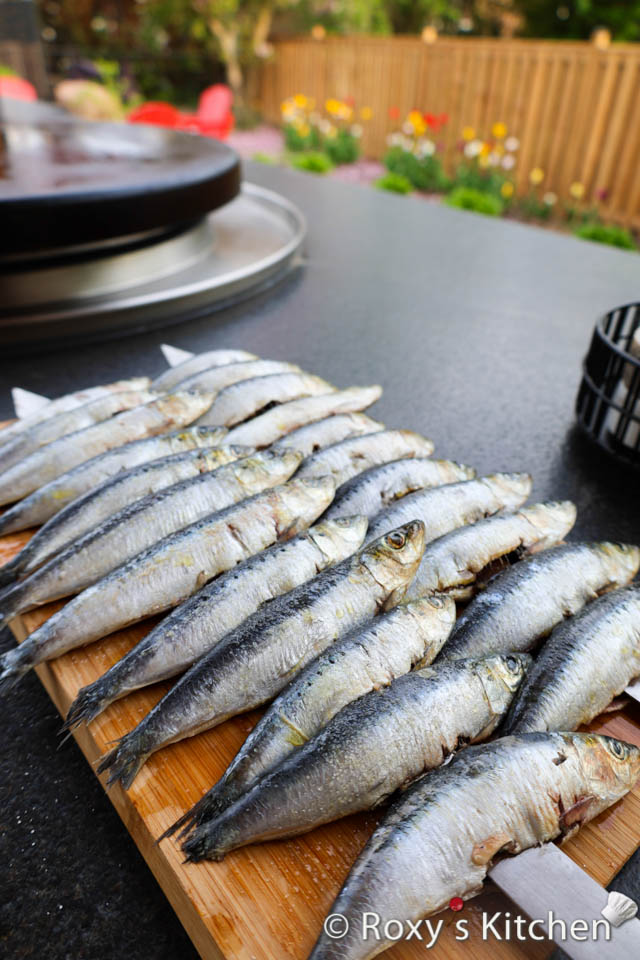
Since an open fire and a bed of olive branches were not an option, I grilled them on a flat-top grill. Whether you grill them on a flat-top grill, a regular BBQ grill or a charcoal grate, you need to preheat the grill and ensure it’s oiled.
Grill the sardine skewers over direct heat for 2-3 minutes on each side, depending on the size of the sardines. They should be crispy when done and a bit charred especially if you cook them over an open fire, charcoal grate or BBQ grill.
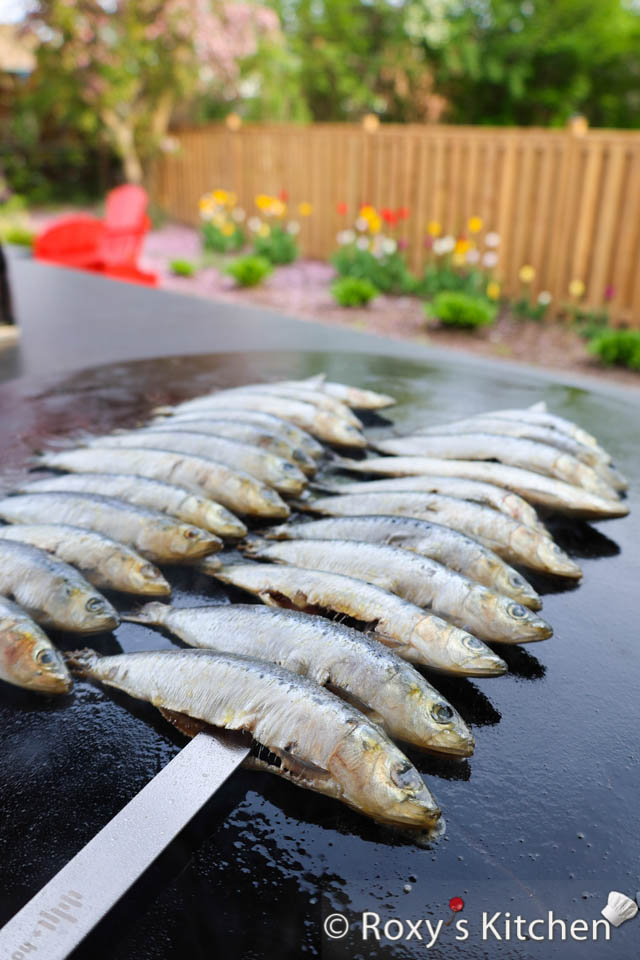
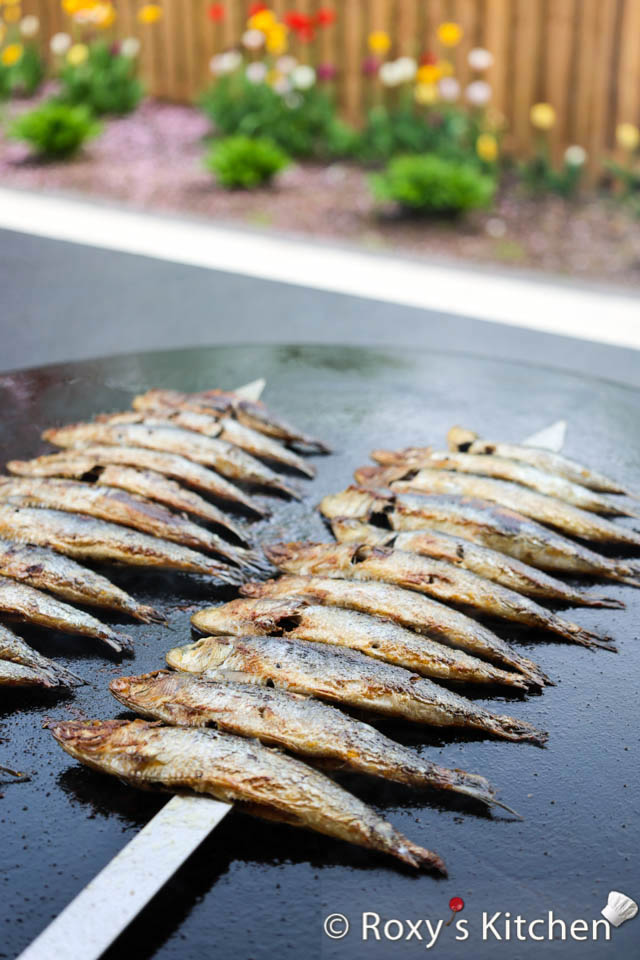
You can also make butterfly sardines and they will turn out even crispier when cooked. To butterfly a sardine, place it on the cutting board, belly side down. Use a sharp knife to make a long, shallow cut down the belly of the fish, starting from the head and ending near the tail. Gently open up the fish, exposing the flesh. I removed the heads and if desired, you can remove the spine as well (I didn’t as the fish is small and you barely feel any bones after grilling them).
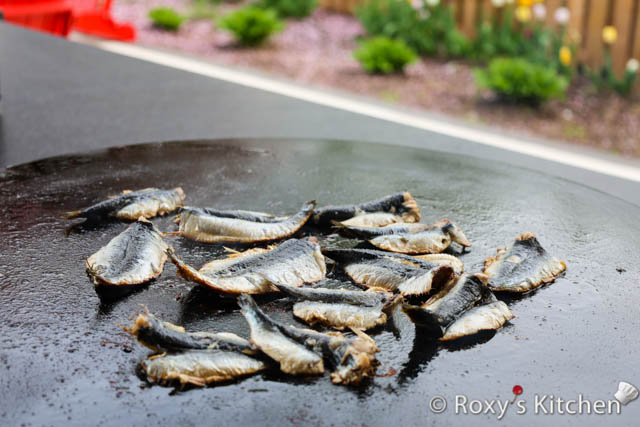
Sardines offer several health benefits due to their nutrient-rich profile. Here are some of the key health benefits of including sardines in your diet:
- Omega-3 Fatty Acids: Sardines are an excellent source of omega-3 fatty acids, specifically EPA (eicosapentaenoic acid) and DHA (docosahexaenoic acid). These fatty acids have been linked to numerous health benefits, including reducing inflammation, improving heart health, supporting brain function, and promoting healthy skin.
- Protein: Sardines are a good source of high-quality protein. Protein is essential for building and repairing tissues, supporting muscle health, and aiding in various metabolic functions.
- Minerals: Sardines are rich in important minerals such as calcium, phosphorus, selenium, and iron. Calcium and phosphorus contribute to bone health, while selenium acts as an antioxidant and supports the immune system. Iron is essential for red blood cell production and preventing iron-deficiency anemia.
- Vitamin B12: Sardines are an excellent source of vitamin B12, a nutrient important for nerve function, DNA synthesis, and the production of red blood cells. Adequate vitamin B12 intake is essential for overall energy production and maintaining a healthy nervous system.
- Vitamin D: Sardines contain vitamin D, a nutrient that plays a crucial role in bone health and immune system function. Vitamin D also supports calcium absorption and helps maintain healthy teeth.
- Rich in Antioxidants: Sardines are a natural source of antioxidants, including selenium and various vitamins like vitamin E. Antioxidants help protect the body against oxidative stress and reduce the risk of chronic diseases.
- Low in Contaminants: Sardines are a small fish with a short lifespan, which means they are less likely to accumulate toxins such as mercury compared to larger fish. This makes them a safer seafood option.




























